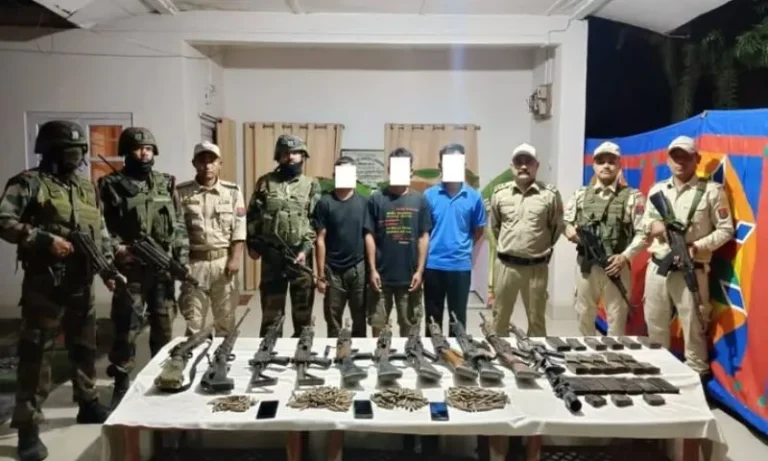Manipur’s O. Ibobi Singh on Assam Rifles’ Role in Negotiations: A Critical Perspective
Summary of the News
Former Manipur Chief Minister O. Ibobi Singh recently commented that if the central government truly desired, the Assam Rifles could potentially negotiate with militants for the release of two abducted students in Manipur. His remarks highlight concerns over the effectiveness of security forces and the central government’s role in addressing militancy in the region.
A Deeper Look into O. Ibobi Singh’s Remarks and Manipur’s Security Crisis
Introduction
The ongoing unrest in Manipur has once again made headlines following the abduction of two students. Former Chief Minister of Manipur, O. Ibobi Singh, has brought forth a provocative yet crucial perspective on the issue. In a recent statement, he claimed that if the central government willed it, the Assam Rifles could request militants to release the abducted students. This raises several questions regarding the role of the central government and security forces in combating insurgency and maintaining peace in Manipur.
In this article, we’ll explore the implications of Ibobi Singh’s statements, the background of the conflict in Manipur, the role of Assam Rifles, and the broader context of how security forces interact with militants.
O. Ibobi Singh’s Critique of the Central Government
A Strong Statement with Serious Implications
O. Ibobi Singh’s remarks carry weight given his political stature and deep understanding of Manipur’s internal conflicts. By stating that the Assam Rifles could ask militants for the release of two abducted students, he essentially implies that the central government is not leveraging its resources effectively. His statement questions whether the central authorities are doing enough to ensure the safety and security of Manipur’s citizens.
The Role of the Assam Rifles
The Assam Rifles, one of the oldest paramilitary forces in India, has been actively involved in maintaining law and order in North Eastern states, including Manipur. They play a significant role in counter-insurgency operations and securing borders. However, the expectation that they could negotiate with militants brings up a new dimension—how much influence do they hold over insurgent groups, and should they be acting as mediators?
Militant Activities in Manipur
Militant groups have been a thorn in the side of Manipur’s governance for decades. They often resort to abductions, extortion, and violent acts to assert control over regions and push forward their political demands. The abduction of the two students is just one example of how insurgent groups continue to destabilize the region. However, expecting military forces like Assam Rifles to negotiate with these groups is a complex issue, as their role traditionally focuses on combat and enforcement, not mediation.
The Broader Security Crisis in Manipur
Ethnic and Political Conflicts
Manipur’s social fabric is woven with complex ethnic identities, which has historically led to tensions. The state is home to multiple ethnic groups, each with its own distinct cultural identity, political aspirations, and in some cases, claims to autonomy. These tensions have often resulted in clashes and have fueled insurgencies.
Insurgency and Government Response
Insurgency has been an ever-present issue in Manipur. Several groups are fighting either for independence or greater autonomy from the Indian government. The government’s response has been multi-pronged, including dialogue, military interventions, and attempts at development. However, incidents like the recent abduction show that insurgency remains a significant challenge.
The Assam Rifles, as part of the central government’s strategy, has been actively involved in counter-insurgency operations, but this also raises the question—how effective is the militarized approach in curbing insurgency?
The Central Government’s Role
O. Ibobi Singh’s critique points directly to the central government’s handling of the situation. The central government’s involvement is critical in addressing Manipur’s security challenges. Singh’s statement essentially calls out the central authorities for not utilizing the Assam Rifles to their full potential, especially when it comes to dealing with insurgent groups and ensuring the safety of civilians.
Is Negotiation with Militants an Option?
The Challenges of Negotiation
Negotiating with militants is a highly contentious issue. On one hand, negotiation could lead to the release of hostages, such as the two students abducted in Manipur. On the other hand, it could set a dangerous precedent, potentially emboldening insurgent groups and giving them more leverage in future confrontations. The Assam Rifles, primarily tasked with combat roles, may not be equipped or authorized to engage in such negotiations without explicit orders from the central government.
Historical Precedents
There have been instances where governments have negotiated with insurgent groups, either directly or through intermediaries. However, these negotiations are often fraught with risks and may not always lead to lasting peace. The question then arises—should the Assam Rifles be expected to engage with militants in such a capacity? And if so, under what circumstances?
Balancing Security and Peace
The challenge for the government is to strike a balance between maintaining security and pursuing peace. A purely militaristic approach may not be sufficient in dealing with deeply rooted insurgencies. At the same time, negotiation without clear guidelines can weaken the state’s position. O. Ibobi Singh’s statement suggests that the Assam Rifles could be used in a more strategic manner, possibly as a tool for negotiation in extreme cases like abductions.
The Role of Assam Rifles: More than Just Combat?
Assam Rifles in Counter-Insurgency
The Assam Rifles have been at the forefront of combating insurgency in Manipur for years. They are skilled in guerrilla warfare and are responsible for safeguarding borders with Myanmar, preventing insurgent groups from using international borders to their advantage. Their combat experience and understanding of the region make them a crucial asset for maintaining law and order in the North-East.
The Possibility of Expanding Their Role
O. Ibobi Singh’s suggestion raises an interesting question—could the role of Assam Rifles be expanded beyond combat to include negotiation? Traditionally, their focus has been on counter-insurgency and border security. Negotiating with insurgents would require a shift in how they operate, possibly necessitating new training and protocols.
What Does This Mean for Manipur’s Future?
The Government’s Next Steps
The government’s next steps will be critical in determining how the situation unfolds. If they choose to heed O. Ibobi Singh’s advice and allow the Assam Rifles to engage in negotiation, it could lead to the release of the abducted students. However, if they stick to a more militarized approach, it could result in continued conflict with insurgent groups.
Public Sentiment
The abduction of students has naturally caused a great deal of concern among the people of Manipur. While some may support a military crackdown on insurgents, others may believe that negotiation is the best way forward. The government will need to consider public sentiment carefully as it formulates its response.
Conclusion
The abduction of two students in Manipur has once again highlighted the challenges facing the state. O. Ibobi Singh’s statement that the Assam Rifles could request militants to release the abductees adds a new layer of complexity to the issue. While the Assam Rifles have been crucial in maintaining security, asking them to negotiate with insurgents could set a new precedent in how the government deals with such situations. Moving forward, the government must strike a careful balance between maintaining security and seeking peaceful resolutions to the region’s ongoing conflicts.
FAQs
- What did O. Ibobi Singh say about the Assam Rifles?
O. Ibobi Singh suggested that the Assam Rifles could request militants to release the abducted students if the central government wished to do so. - What is the role of Assam Rifles in Manipur?
Assam Rifles are a paramilitary force involved in counter-insurgency and border security operations in Manipur and other North-Eastern states. - How has the government responded to the abduction of the students?
The government has condemned the abduction and is considering multiple approaches, including military action, to address the situation. - Why is negotiation with militants controversial?
Negotiation with militants is controversial because it can set a precedent that encourages further criminal acts, but it may also be the best way to secure the release of hostages. - What is the public sentiment in Manipur regarding the abduction?
The public is deeply concerned and divided between those who want military action and those who believe negotiation is the best solution.


